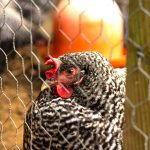Chickens have specific requirements for cold weather survival. While generally more cold-tolerant than heat-tolerant, chickens still need special care during winter. They are prone to frostbite, particularly on their combs and wattles, and can develop respiratory issues if exposed to drafts or prolonged extreme cold.
Chickens naturally reduce food and water intake in cold weather, which can impact their health and egg production. To thrive in cold conditions, chickens require a dry, draft-free environment with access to fresh water and nutritious food. Proper shelter, bedding, and insulation are essential to protect them from the elements and maintain body temperature.
Natural heat sources and the deep litter method can help create a warm environment. Regular monitoring of chicken behavior and making necessary adjustments ensures their comfort and health throughout winter.
Table of Contents
- 1 Providing Proper Shelter and Bedding
- 2 Utilizing Natural Heat Sources
- 3 Insulating the Coop
- 4 Using Deep Litter Method
- 5 Providing Warm Water and Nutritious Food
- 6 Monitoring and Adjusting for Optimal Comfort
- 7 FAQs
- 7.1 What are the best ways to keep chickens warm in winter without electricity in the UK?
- 7.2 How can I insulate my chicken coop to keep it warm in winter?
- 7.3 What is deep litter bedding and how can it help keep chickens warm in winter?
- 7.4 What type of feed should I provide to keep my chickens warm in winter?
- 7.5 Are there any heat-retaining materials I can use to keep my chicken coop warm in winter?
Key Takeaways
- Chickens need protection from cold weather to stay healthy and comfortable
- Proper shelter and bedding are essential for keeping chickens warm
- Natural heat sources like sunlight and compost can help keep chickens warm
- Insulating the coop can help retain heat and keep chickens comfortable
- The deep litter method can provide additional warmth and insulation for chickens
- Warm water and nutritious food are important for keeping chickens healthy in cold weather
- Regular monitoring and adjustments are necessary to ensure chickens’ optimal comfort in cold weather
Providing Proper Shelter and Bedding
Coop Conditions
First and foremost, the coop should be dry and draft-free. This means repairing any leaks in the roof or walls and sealing any gaps where drafts could enter.
Ventilation and Bedding
It’s also important to ensure that the coop is well-ventilated to prevent moisture buildup, which can lead to respiratory issues for the chickens. Additionally, providing adequate bedding is crucial for keeping the chickens warm and comfortable. Good options for bedding include straw, hay, or wood shavings, which provide insulation and absorb moisture.
Maintenance and Outdoor Space
The bedding should be kept clean and dry, and replaced as needed to maintain a healthy environment for the chickens. In addition to the coop, it’s important to provide a covered outdoor area where the chickens can still get some fresh air and exercise without being exposed to harsh weather conditions. This area should be protected from wind and precipitation, and can be covered with a tarp or other suitable material.
Creating a Comfortable Environment
By providing proper shelter and bedding, you can create a comfortable environment for your chickens to stay warm and healthy during the winter.
Utilizing Natural Heat Sources

In addition to providing proper shelter and bedding, utilizing natural heat sources can help keep your chickens warm during cold weather. One of the best natural heat sources for chickens is the sun. Positioning the coop so that it receives maximum sunlight during the day can help warm up the interior and provide some natural warmth for the chickens.
Additionally, allowing the chickens access to a sunny outdoor area can give them the opportunity to bask in the sun and warm themselves. Another natural heat source that can be utilized is compost. Compost piles generate heat as they decompose, and positioning the coop near a compost pile can help provide some warmth for the chickens.
Just be sure that the compost pile is not too hot or emitting harmful gases that could be harmful to the chickens. By taking advantage of natural heat sources like sunlight and compost, you can help keep your chickens warm and comfortable during the winter months.
Insulating the Coop
Insulating the coop is another important step in keeping your chickens warm during cold weather. Insulation helps retain heat and prevent drafts, creating a more comfortable environment for the chickens. There are several options for insulating a coop, including adding insulation to the walls, ceiling, and floor.
Common insulation materials include foam board, fiberglass batts, or even recycled denim insulation. It’s important to ensure that any insulation material used is non-toxic and safe for the chickens. In addition to adding insulation, it’s important to seal any gaps or cracks in the coop where drafts could enter.
This can be done using caulk or expanding foam to fill in any gaps around windows, doors, or vents. By insulating the coop and sealing any drafts, you can help maintain a consistent temperature inside the coop and keep your chickens warm and comfortable throughout the winter.
Using Deep Litter Method
The deep litter method is a popular technique for keeping chickens warm and comfortable during cold weather while also managing waste in the coop. This method involves adding a thick layer of bedding material to the floor of the coop and allowing it to build up over time as new bedding is added on top. As the bedding decomposes, it generates heat which helps keep the coop warm.
Additionally, the decomposing bedding creates a beneficial environment for beneficial microorganisms that help break down waste and control odors. To use the deep litter method, start by adding a thick layer of bedding material such as straw, hay, or wood shavings to the floor of the coop. As the bedding accumulates waste and begins to decompose, add more bedding on top rather than removing it.
It’s important to regularly turn over the bedding to aerate it and promote decomposition. By using the deep litter method, you can create a warm and cozy environment for your chickens while also managing waste in an efficient and sustainable way.
Providing Warm Water and Nutritious Food

Access to Warm Water
Chickens tend to reduce their food and water intake in cold weather, making it essential to encourage them to drink enough to stay hydrated. Providing warm water can help prevent dehydration and keep your chickens healthy. You can achieve this by using heated waterers or regularly replacing frozen water with fresh warm water throughout the day.
Nutritious Food for Energy
In addition to warm water, it’s vital to provide high-energy food to help keep your chickens warm and healthy. You can offer high-quality chicken feed supplemented with grains or seeds for extra energy. This will help maintain their body temperature and energy levels during the cold weather.
Treats for an Extra Boost
You can also provide special treats like mealworms or scratch grains to give your chickens an extra energy boost during the cold weather. These treats can be a great way to keep your chickens happy and healthy throughout the winter months.
By following these tips, you can ensure that your chickens stay healthy, comfortable, and thrive during the cold winter months.
Monitoring and Adjusting for Optimal Comfort
Finally, it’s important to monitor your chickens’ behavior and make adjustments as needed to ensure their optimal comfort during cold weather. Pay attention to how they are behaving – if they are huddling together or fluffing up their feathers, they may be too cold and need additional warmth. If they are panting or holding their wings away from their bodies, they may be too hot and need more ventilation.
Additionally, regularly checking on the condition of the coop, bedding, and insulation can help identify any issues that need attention. If you notice any drafts or leaks in the coop, seal them promptly to prevent heat loss. If the bedding becomes too wet or starts emitting strong odors, it may need to be turned over or replaced with fresh bedding.
By monitoring your chickens’ behavior and making adjustments as needed, you can ensure that they stay comfortable and healthy throughout the winter months. In conclusion, understanding the cold weather needs of chickens is crucial for ensuring their health and well-being during the winter months. By providing proper shelter and bedding, utilizing natural heat sources, insulating the coop, using the deep litter method, providing warm water and nutritious food, and monitoring their behavior, you can create a comfortable environment for your flock to thrive in cold weather.
With these strategies in place, you can ensure that your chickens stay healthy and happy throughout the winter months.
If you’re looking for more tips on how to keep your chickens warm in the winter without electricity in the UK, you might want to check out this article on how to insulate a chicken coop. It provides helpful information on insulating your coop to keep your chickens cozy during the colder months.
FAQs
What are the best ways to keep chickens warm in winter without electricity in the UK?
There are several effective methods to keep chickens warm in winter without electricity in the UK. These include insulating the coop, using deep litter bedding, providing extra feed, and using heat-retaining materials.
How can I insulate my chicken coop to keep it warm in winter?
Insulating the chicken coop can help retain heat and keep the chickens warm in winter. This can be done by adding insulation to the walls, ceiling, and floor of the coop. Additionally, sealing any drafts and ensuring proper ventilation can help maintain a comfortable temperature inside the coop.
What is deep litter bedding and how can it help keep chickens warm in winter?
Deep litter bedding involves adding layers of organic material such as straw, hay, or wood shavings to the floor of the coop. As the bedding decomposes, it generates heat which can help keep the coop warm. It also provides insulation and helps absorb moisture, creating a more comfortable environment for the chickens.
What type of feed should I provide to keep my chickens warm in winter?
During the winter months, it is important to provide your chickens with a high-quality, energy-rich feed to help them stay warm. This can include grains, seeds, and high-protein feeds. Additionally, providing extra feed in the evening can help the chickens generate heat through digestion during the night.
Are there any heat-retaining materials I can use to keep my chicken coop warm in winter?
Using heat-retaining materials such as thermal blankets, bubble wrap, or even recycled carpet can help insulate the coop and retain heat. These materials can be applied to the walls, windows, and doors of the coop to help maintain a warmer temperature inside.
Meet Walter, the feathered-friend fanatic of Florida! Nestled in the sunshine state, Walter struts through life with his feathered companions, clucking his way to happiness. With a coop that’s fancier than a five-star hotel, he’s the Don Juan of the chicken world. When he’s not teaching his hens to do the cha-cha, you’ll find him in a heated debate with his prized rooster, Sir Clucks-a-Lot. Walter’s poultry passion is no yolk; he’s the sunny-side-up guy you never knew you needed in your flock of friends!







